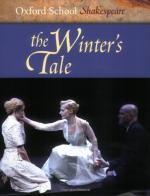|
This section contains 16,115 words (approx. 54 pages at 300 words per page) |

|
Lynn Enterline, Yale University
Between Leontes's opening imperative, "Tongue-tied our queen? Speak you" (1.2.28), and the final act, where Hermione as living statue returns to her husband yet says nothing directly to him, The Winter 's Tale traces a complex, fascinated, and uneasy relation to female speech.1 A play much noted for interrogating the "myriad forms of human narration"2—old tales, reports, ballads, oracles—The Winter 's Tale begins its investigation of language when Hermione tellingly jests to Polixenes, "Verily, / You shall not go; a lady's 'verily' is / As potent as a lord's" (11. 49-51), for Leontes's swift turn to suspicion hinges on the power of his wife's speech. Unable to persuade Polixenes to stay, he first expresses annoyance when Hermione is able to do so. Polixenes has just assured his boyhood friend "There is no tongue that moves, none, none i' th' world, / So soon as yours could win...
|
This section contains 16,115 words (approx. 54 pages at 300 words per page) |

|


